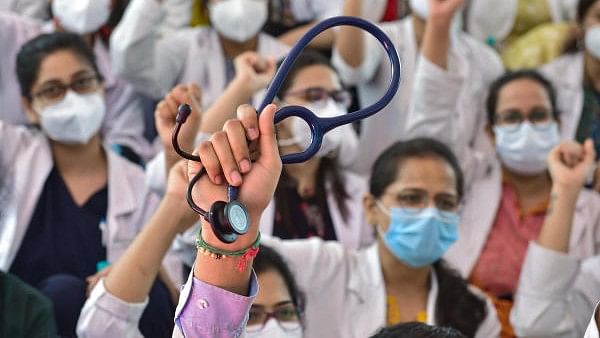
Representative image of medical students.
Credit: PTI Photo
New Delhi: The National Medical Commission (NMC) has barred the faculty in medical colleges from engaging in private practice during college hours and made 75 per cent attendance mandatory for them, a step that will help deal with the problem of ghost faculty.
The medical regulator issued the 'Minimum Standard of Requirements for Postgraduate Courses-2023 (PGMSR-2023)' guidelines last week.
"Faculty shall be full-time and shall not engage in private practice during college hours. It shall be mandatory to have at least 75 per cent attendance of the total working days for the required number of faculties," the guidelines read.
The guidelines also stipulated that 80 per cent of hospital beds should be occupied throughout the year by patients requiring inpatient care and minimum 15 per cent of the total beds in the department imparting post-graduate training should be Intensive Care Unit (ICU) beds/high dependency unit (HDU) beds exclusively of that department.
The guidelines stated that hospital building shall conform to existing national building norms and various local statutory regulations for hospitals taking into consideration requirements of the hospital as a service provider, including administration, registration, records storage, out-patient and inpatient areas, operating theatres, ICU, radiology and laboratory services and emergency areas, etc.
There shall be an increase in the faculty, infrastructure and other staff in subjects of radio-diagnosis, anaesthesia, pathology, microbiology, and biochemistry with the increase in the number of beds in the hospital. Also, there shall be an increase in the faculty and infrastructure, if workload in the department is more, the guidelines stated.
Post-graduate medical colleges or institutes started under Section 3.1(iii) of PGMER-23 (Standalone post-graduate medical college/institute) will have minimum 220 beds and will compulsorily have the functional departments of biochemistry, pathology, microbiology, radio diagnosis, anaesthesiology (when there are surgical speciality).
The institution shall have adequate in-house laboratory and imaging facilities for training of post-graduate students, which should be fully run by the respective department.
Laboratories shall provide all the investigative facilities required and shall be regularly updated keeping in view the advancement of knowledge, science and technology and for research requirements.
There shall be digital data of records of investigations done in various departments and laboratories besides a well-equipped air-conditioned blood bank capable of providing component therapy.